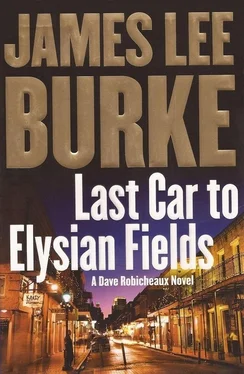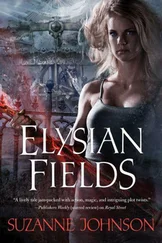“I’m happy to hear that,” he said.
“Thank you for your time, Mr. LeJeune,” I said.
He made no reply. Even though I had managed to control my anger I felt like a fool, one of that great army of salaried public servants who were treated by the very rich as doormen and security guards. I got in my cruiser and began backing down the long, shaded driveway to the state road, the sun flashing through the canopy like the reflection off a heliograph. When I reached the entrance to the state road I had to wait for a long line of cane trucks to pass, the wagon beds swaying heavily with the enormous loads they carried. In the meantime Castille LeJeune had gotten into his Oldsmobile and was driving toward me.
I got out of the cruiser and walked to his car, then waited for him to roll down the window. “I’m sorry, I forgot to leave you a business card,” I said, and placed it on his dashboard. “I think something real bad happened to Junior Crudup. Please be advised there’s no statute of limitation on murder in the state of Louisiana, Mr. LeJeune. By the way, it was an honor to meet Audie Murphy because he seemed to be both a patriot and a straight-up guy who didn’t try to get by on bullshit.”
On Tuesday morning Helen called me into her office. “I just got off the phone with Castille LeJeune’s attorney. He says you made a nasty accusation yesterday at LeJeune’s house,” she said.
“News to me.”
“You think you can jam a guy like Castille LeJeune?”
“He’s lying about Junior Crudup.”
“The R&B convict again?”
“Right.”
“How about we concentrate on crimes in this century? Starting with the homicide at the daiquiri store.”
“No matter what avenue we take, I think it’s going to lead back to LeJeune.”
“Maybe because you want it to.”
“Say again?”
“You hate rich people, Dave. You can’t wait to get into it with them.”
“No, I just don’t like liars.”
“Can you do me a favor?”
“What?”
“Go somewhere else. Now.”
That afternoon Father Jimmie Dolan was at a basketball practice in a Catholic high school gymnasium not far from his church, when his cell phone rang inside his gym bag. “Father Dolan,” he said into the receiver.
“I need only a quick word. Don’t be hanging up on me now,” the caller said.
“How did you get this number?”
“Told the secretary at the rectory I was your grandfather. I need something from you.”
“What could I possibly have that you want?”
“I was paid to take out this fellow Ardoin. But I’m not going to do it.”
“You didn’t answer my question. What is it you want?”
“There’s an open contract on me, Father. That means I’m anybody’s fuck. But they messed with the wrong fellow, you get my drift?”
“No, and I don’t want to.”
“I’m going to loosen some people’s earthly ties.”
Father Jimmie stared listlessly across the gym at the boys who were taking turns laying up shots under the basket. He had a sore throat and fever and wanted nothing else in life at that moment except a glass of whiskey and a warm bed to lie down in.
“You know what I’m asking from you, don’t you?” Max Coll said.
“I think you want absolution for your sins, Max. But you can’t have it. Not over the phone, certainly. And perhaps never, not unless you give up your violent ways.”
The cell phone was silent.
“Did you hear me?” Father Jimmie said.
“I think I’ve misjudged you. Under it all you’re a hard-nosed bastard of a kind I remember only too well, one whose cassock and collar come before his humanity. Shite if you’re not a disappointment to me.”
The transmission went dead. Father Jimmie’s cheek stung as though it had been slapped.
That evening I fixed a bowl of milk for a stray cat and watched him drink it on the gallery. He was a hard-bodied, short-haired, unneutered white cat with chewed ears and pink claw scars inside his coat. His tail was as thick as a broom handle. When I petted him he looked at me blankly, then went back to his milk.
Theodosha Flannigan pulled her Lexus into the driveway and parked under the pecan tree by the side of the house. A guitar in an expensive case was propped up in the backseat. She wore loafers and a blue terry cloth blouse and jeans low on her hips so they exposed her stomach. The wind gusted and leaves swirled around her, and a single band of dusky sunlight cut across her face.
“What’s the name of your little friend?” she asked, sitting down on a step next to the cat.
“He didn’t say,” I replied.
She picked the cat up in her arms and kissed him on top of his head.
Then she flipped him on his back and set him in the crevice formed by her thighs and straightened his body by pulling his tail as though it were a strap on a piece of luggage. She scratched him between his ears and under his chin. “We’re going to call him Mr. Adorable. No, we’re going to call him Snuggs,” she said.
“What’s happening’, Theo?” I said.
“I heard about your visit to my father’s house.”
“Your father has a problem with the truth. He doesn’t think he needs to tell it.”
“He says you talked to him as though he were a criminal.”
“I talked to him as though he were an ordinary citizen. He didn’t like it. Then, rather than confront me about it, he used his attorney to report me to the sheriff.”
“He comes from a different generation, Dave. Why don’t you have a little compassion?”
Time to disengage, I said to myself. The streetlights were coming on under the oak trees, and the air was cool and damp and I could smell an odor like scorched brown sugar from the mills. Theo set down the cat and stroked his back, then stood up. “You want to see my new guitar?” she asked.
“Sure. I didn’t know you played,” I said.
She came back from the car with her guitar and unsnapped the case. “I’m not very good. My mother was, though. I have some old tapes of her singing some of Bessie Smith’s songs. She could have been a professional. The only person I’ve ever heard like her is Joan Baez,” she said.
Theo removed the guitar from its case and sat down again on the steps.
She made a chord on the neck and brushed her thumb across the strings, then began singing “Corina, Corina” in Cajun French. She had been much too humble about her ability. Her voice was lovely, her accompaniment with herself perfect as she ran each chord into the next. In fact, like all real artists, she seemed to disappear inside the thing she created, as though the identity by which others knew her had nothing to do with the inner realities of her life.
She smiled at me when she finished, almost like a woman delivering a kiss after she has made love.
“Gee, you’re great, Theo,” I heard myself saying.
“My mother used to sing that. I don’t remember her well, but I remember her singing that song to me before I went to sleep,” she said.
She began putting away her guitar.
The cat she had named Snuggs nuzzled his head against her knee. The wind riffled through the oak and pecan trees overhead, and a group of children on their way to the library rode by on bicycles, laughing, the streetlights glowing in the dampness like the oil lamps in a Van Gogh painting. There was not a mechanized sound on the street, only the easy sweep of wind and the scratching of leaves on the sidewalk. I didn’t want the moment to end.
But like the canker in the rose or the serpent uncoiling itself out of an apple tree, there had been an element in Theo’s song that disturbed me in a way I couldn’t let go of.
“The melody for “Corina, Corina’ is the same as “The Midnight Special,”” I said.
Читать дальше












